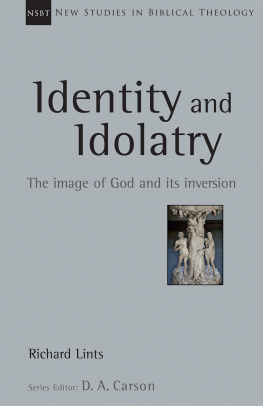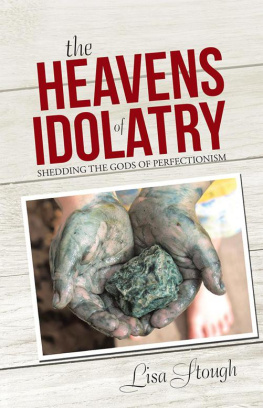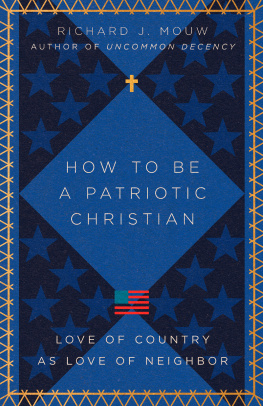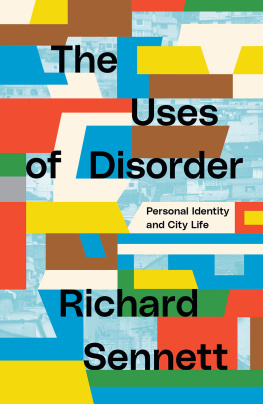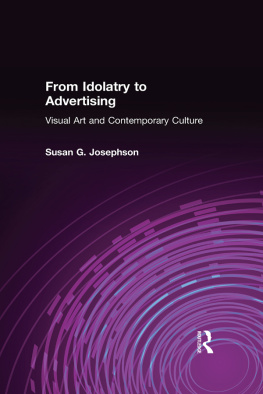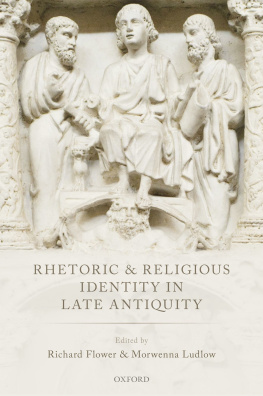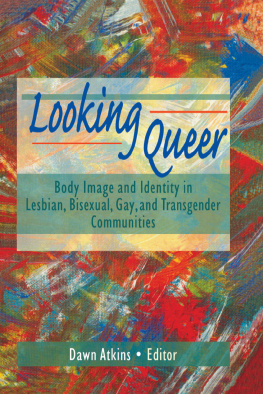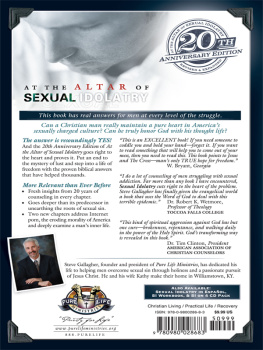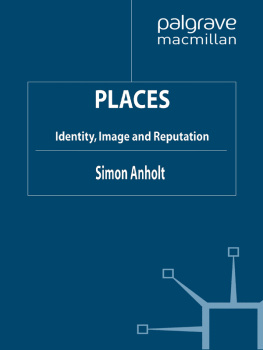Richard Lints - Identity and Idolatry: The Image of God and Its Inversion
Here you can read online Richard Lints - Identity and Idolatry: The Image of God and Its Inversion full text of the book (entire story) in english for free. Download pdf and epub, get meaning, cover and reviews about this ebook. year: 2015, publisher: InterVarsity Press / IVP Academic, genre: Religion. Description of the work, (preface) as well as reviews are available. Best literature library LitArk.com created for fans of good reading and offers a wide selection of genres:
Romance novel
Science fiction
Adventure
Detective
Science
History
Home and family
Prose
Art
Politics
Computer
Non-fiction
Religion
Business
Children
Humor
Choose a favorite category and find really read worthwhile books. Enjoy immersion in the world of imagination, feel the emotions of the characters or learn something new for yourself, make an fascinating discovery.
- Book:Identity and Idolatry: The Image of God and Its Inversion
- Author:
- Publisher:InterVarsity Press / IVP Academic
- Genre:
- Year:2015
- Rating:3 / 5
- Favourites:Add to favourites
- Your mark:
- 60
- 1
- 2
- 3
- 4
- 5
Identity and Idolatry: The Image of God and Its Inversion: summary, description and annotation
We offer to read an annotation, description, summary or preface (depends on what the author of the book "Identity and Idolatry: The Image of God and Its Inversion" wrote himself). If you haven't found the necessary information about the book — write in the comments, we will try to find it.
Richard Lints: author's other books
Who wrote Identity and Idolatry: The Image of God and Its Inversion? Find out the surname, the name of the author of the book and a list of all author's works by series.
Identity and Idolatry: The Image of God and Its Inversion — read online for free the complete book (whole text) full work
Below is the text of the book, divided by pages. System saving the place of the last page read, allows you to conveniently read the book "Identity and Idolatry: The Image of God and Its Inversion" online for free, without having to search again every time where you left off. Put a bookmark, and you can go to the page where you finished reading at any time.
Font size:
Interval:
Bookmark:
NEW STUDIES IN BIBLICAL THEOLOGY 36
Series editor: D. A. Carson
ITS INVERSION
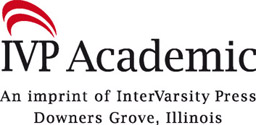
InterVarsity Press, USA
P.O. Box 1400
Downers Grove, IL 60515-1426, USA
ivpress.com
Richard Lints 2015
Richard Lints has asserted his right under the Copyright, Designs and Patents Act, 1988, to be identified as Author of this work.
All rights reserved. No part of this publication may be reproduced, stored in a retrieval system, or transmitted, in any form or by any means, electronic, mechanical, photocopying, recording or otherwise, without the prior permission of the publisher or the Copyright Licensing Agency.
InterVarsity Press, USA, is the book-publishing division of InterVarsity Christian Fellowship/ USA and a member movement of the International Fellowship of Evangelical Students. Website: intervarsity.org.
Scripture quotations, unless otherwise noted, are from The Holy Bible, English Standard Version, copyright 2001 by Crossway Bibles, a division of Good News Publishers. Used by permission. All rights reserved.
First published 2015
USA ISBN 978-0-8308-9849-7 (digital)
USA ISBN 978-0-8308-2636-0 (print)
This digital document has been produced by Nord Compo.
To Ann:
The light of my life in whose reflection the gospel shines clear
New Studies in Biblical Theology is a series of monographs that address key issues in the discipline of biblical theology. Contributions to the series focus on one or more of three areas: (1) the nature and status of biblical theology, including its relations with other disciplines (e.g. historical theology, exegesis, systematic theology, historical criticism, narrative theology); (2) the articulation and exposition of the structure of thought of a particular biblical writer or corpus; and (3) the delineation of a biblical theme across all or part of the biblical corpora.
Above all, these monographs are creative attempts to help thinking Christians understand their Bibles better. The series aims simultaneously to instruct and to edify, to interact with the current literature and to point the way ahead. In Gods universe mind and heart should not be divorced: in this series we will try not to separate what God has joined together. While the notes interact with the best of scholarly literature, the text is uncluttered with untransliterated Greek and Hebrew, and tries to avoid too much technical jargon. The volumes are written within the framework of confessional evangelicalism, but there is always an attempt at thoughtful engagement with the sweep of the relevant literature.
Those who know him have long appreciated the ability of Richard Lints to think creatively while remaining soaked in joyful confessionalism. Begin with the imago Dei, which in times past has often been thought of in terms of essential characteristics or attributes, but which is here thought of in terms of a mirror reflecting God and of subtle differences that stand over against him, making relationship with him possible in short, establishing our identity with respect to God. Work that out across the canon, and you discover that light shines on many topics, not least the nature of idolatry. This book manages to blend some elements of systematic theology with careful biblical theology to produce a study that is wonderfully evocative.
D. A. Carson Trinity
Evangelical Divinity School
Identity is a term with a thousand different connotations but few know its precise denotation. What after all is identity? What makes me, me? What makes you, you? This book grew out of the conviction that the more we try to answer that question straightforwardly, the less likely we are to answer it at all. The irony of identity is that by looking away from ourselves we are more likely to discover our identity. Part of that is the complexity of self-identity itself. Part of it is the difficulty of genuine self-awareness. And part of it is the mystery of being created as people who find their identity in their capacity to reflect the Creator and the created order. This book is centrally about that mystery.
No simple description captures all of who we are, nor of the many influences that have been woven into our character. So it is with this book. Its origins lie almost too far back in the past to recover and record them faithfully. A seminar here. A hallway conversation there. A dinner table discussion with my family. Reading Genesis with a new set of eyes. Realizing how important the golden calf story is, but for reasons quite different from what I had originally thought. Finding the most incisive analysis of idolatry in the writings of the most acerbic critic of religion in the nineteenth century. Researching the rise of the modern marketing industry and recognizing how clearly it illustrates the design of the created order. Watching contemporary films and the fascination with the management of impressions that is at the heart of the film world. All of these, and more, pulled me in a thousand different directions when it was time to think about personal identity, but strangely also focused my attention on the Scriptures more sharply than I could have imagined. This book is an attempt to pull together many threads by following one of them from the beginning and seeing it through to its conclusion. That thread is nothing other than the way in which the Bible speaks about our identity as an image and reflection. From that simple origin I hope this work takes you on a journey of surprising discoveries.
This book is also a reflection of many influences in my own life and work. The conceptual origins of the book go back to the work (and friendship) of Meredith G. Kline. He taught me to see the text as a whole and never to miss the forest for the trees. I will never forget the significance of that persistent voice of Meredith. One of Merediths students and now one of my colleagues, Cathy McDowell, has written a remarkable dissertation on the early chapters of Genesis that further opened my eyes to these words of Scripture that speak powerfully to the the forest and the trees of personal identity. Many others also reinforced that redemptive-historical, biblicaltheological, big picture way of reading Scripture. Henri Blocher, Gordon Hugenberger, T. David Gordon, Greg Beale, D. A. Carson and Royce Greunler come very quickly and fondly to mind. Dear friends Michael Horton, Kelly Kapic and Paul Lim insisted that the best biblical theology would also be that which interacted with the wider world of critical scholarship. I hope they see their fingerprints all over this book. Long-time colleague David Wells as well as conversation partners Dick Keyes and Os Guinness taught me the inextricable connection between personal identities and cultural identities which is also the heart of Scriptures conception of identity. Many of my students across the years have contributed to this work in explicit and mostly implicit ways. Brannin Pitre, Blake Arnoult and Derek Baker come immediately to mind across the last decade, as does Daniel Paik this past year, who laboured to put the indexes together.
Closer to home there is little doubt that my own reflections on personal identity are bound up with my identity in the context of my family. Kate and Lucas and Sarah and now Nathan have been surprising mirrors for me, helping me to see myself more clearly than I could ever otherwise have hoped for. They have learned not only to laugh with me but at me, and have thereby helped me not to take myself too seriously. They are adept at raising their eyebrows when my attempt at parental persuasion overreaches the argument itself. I trust that I am more comfortable in my own skin because they have unconditionally accepted me even if that unconditional acceptance sometimes comes with disagreements.
Font size:
Interval:
Bookmark:
Similar books «Identity and Idolatry: The Image of God and Its Inversion»
Look at similar books to Identity and Idolatry: The Image of God and Its Inversion. We have selected literature similar in name and meaning in the hope of providing readers with more options to find new, interesting, not yet read works.
Discussion, reviews of the book Identity and Idolatry: The Image of God and Its Inversion and just readers' own opinions. Leave your comments, write what you think about the work, its meaning or the main characters. Specify what exactly you liked and what you didn't like, and why you think so.

